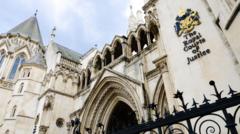Will Palestine Action Face a Ban After Court Ruling?

The Implications of the Ban on Palestine Action: A Deep Dive
On a significant and controversial note, Palestine Action is set to be banned from midnight following a High Court ruling that denied the group's request to halt the government's decision to classify it as a terrorist organization. This unprecedented move raises pressing questions about civil liberties, the nature of protest, and the implications for activists in the UK. This article explores the events leading up to this decision, its legal ramifications, and the broader socio-political context that surrounds it.
Understanding the Context: What Led to the Ban?
The government's decision to ban Palestine Action comes in the wake of substantial property damage attributed to the group. Specifically, an estimated £7 million worth of damage was reported at RAF Brize Norton last month, an action the group took responsibility for. This incident has sparked a national dialogue on the limits of protest, civil disobedience, and how far individuals and groups can go in pursuit of their political objectives.
Palestine Action is known for its direct action approach, which, while controversial, has been framed by its supporters as a necessary response to the ongoing plight of Palestinians. However, the government views these actions through a different lens, categorizing them as terrorist activities due to the potential for public disturbance and property damage.
The Legal Framework: The Terrorism Act 2000
The proposed ban amends the Terrorism Act 2000, broadening its scope to include groups that engage in direct action against state interests. This shift highlights a growing trend in government policies aimed at curbing dissent and controlling narratives surrounding sensitive political issues. The implications of this amendment are extensive:
- Criminalization of Support: Supporting Palestine Action will now be classified as a criminal offense, which raises concerns about freedom of speech and the right to peaceful assembly.
- Severe Penalties: Membership or public support for the group could result in sentences of up to 14 years in prison, a stark warning to potential activists.
- Precedent Setting: This is the first instance in UK history where a direct action group that does not advocate violence is being labeled as terrorist, setting a worrying precedent for future activist movements.
The Judicial Response: A Controversial Ruling
The High Court's refusal to grant Palestine Action more time to pursue legal action against the government's decision has drawn significant criticism. Raza Husain KC, representing co-founder Huda Ammori, described the ruling as "ill-considered" and a potential "authoritarian abuse" of power.
Such statements reflect a growing concern among civil liberties advocates that the legal system is being used to suppress dissent rather than protect it. The ruling has sparked debates around the balance between national security and individual freedoms, especially in a democratic society.
Public Reaction and Civil Society Response
The decision to ban Palestine Action has prompted a variety of responses from civil society, human rights organizations, and the general public. Many view the government's actions as an infringement on democratic rights and an attempt to silence dissenting voices. Some key reactions include:
- Protests: Activists have begun organizing protests against the ban, arguing that it stifles free expression and the right to protest.
- Legal Challenges: Legal experts are exploring avenues for challenging the government's decision, potentially leading to further court battles.
- Public Discourse: The ban has ignited discussions about the nature of activism, with many questioning what constitutes legitimate protest in a democratic society.
The Broader Implications: Impact on Activism in the UK
This ban not only affects Palestine Action but sets a worrying precedent for other activist groups in the UK. As the government continues to tighten its grip on dissent, several broader implications emerge:
1. Chilling Effect on Activism
The fear of severe penalties for expressing support for certain groups may deter individuals from engaging in activism altogether. This chilling effect can lead to a more subdued public discourse and a lack of diverse opinions on critical issues.
2. Marginalization of Political Movements
Groups advocating for marginalized communities may find it increasingly difficult to operate freely. The classification of activism as terrorism could lead to increased surveillance and policing of protest activities, further marginalizing voices that desperately need to be heard.
3. Erosion of Democratic Rights
As the government extends its powers to restrict dissent, there is a potential erosion of democratic rights. This trend raises profound questions about the health of democracy in the UK and whether citizens will continue to have the freedom to express their views without fear of retribution.
Conclusion: Navigating the Future of Activism in a Restrictive Environment
The ban on Palestine Action reflects a significant turning point in the relationship between the government and activist groups in the UK. As legal battles ensue and public sentiment continues to evolve, the outcomes will be crucial in shaping the future landscape of activism. It begs the question: how far is too far when it comes to the government's role in regulating dissent?
The dialogue surrounding this issue is far from over, and it is imperative for citizens to remain engaged and informed about the implications of these developments on their rights and freedoms.
FAQs
What is Palestine Action and what do they stand for?
Palestine Action is a direct action group that advocates for Palestinian rights through various forms of protest, including civil disobedience. They work to raise awareness of issues related to the Israeli-Palestinian conflict.
What are the potential consequences of the ban on Palestine Action?
The ban criminalizes support for the group, with penalties of up to 14 years in prison for membership or expressing support. This could deter activism and suppress free expression related to Palestinian rights.
How does this ban compare to previous government actions against activist groups?
This ban is unprecedented in that it targets a non-violent direct action group and categorizes it as a terrorist organization. This sets a worrying precedent for how future activist movements may be treated by the state.
What can individuals do in response to the ban?
Individuals can engage in discussions about the implications of the ban, participate in peaceful protests, and support legal challenges against the government's decision. Staying informed and active in civil society is crucial.
As the landscape of activism continues to evolve, what strategies do you think would best support the rights of activists in the face of government pushback? #Activism #CivilRights #PalestineAction
Published: 2025-07-04 17:27:12 | Category: technology



